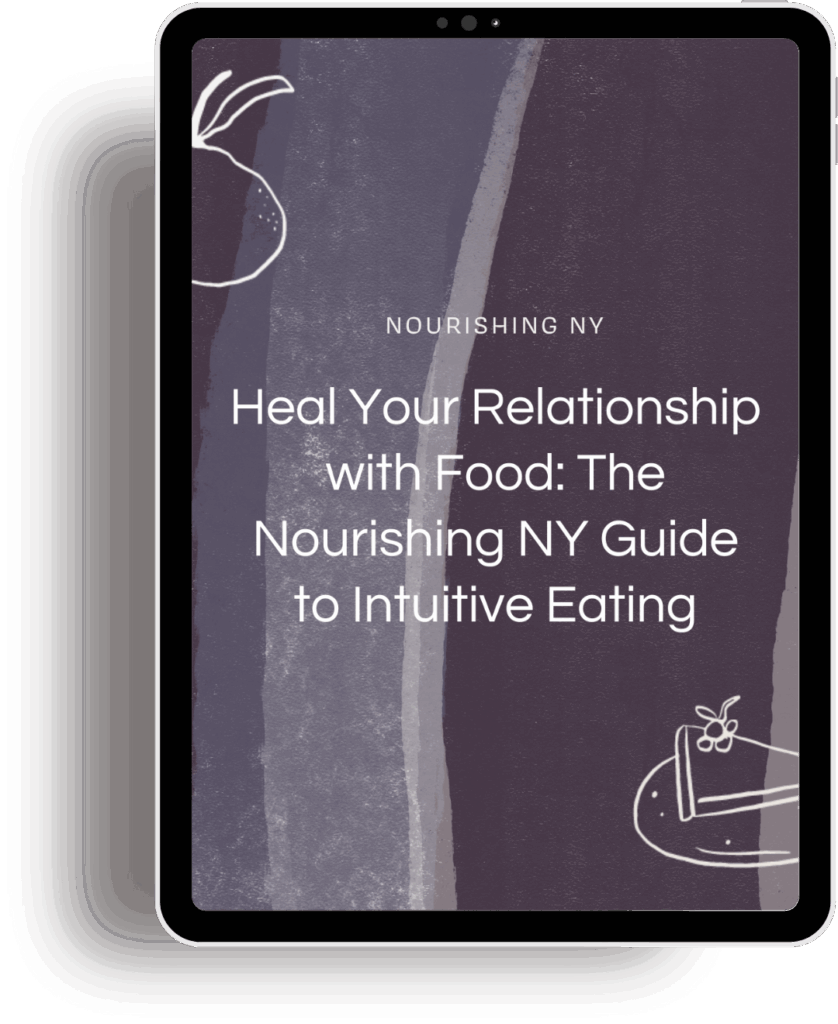Introduction:
In a society where diet culture is so present, it can be incredibly difficult to dismantle these beliefs and not engage in what almost seems as “fact”. Conflicting information and dieting advice can oftentimes lead to disordered eating habits, which can be influenced by fear, and not fact. A compassionate approach to healing from disordered eating is possible with our experienced eating disorder nutritionist in NYC. Our team is dedicated to providing personalized support and guidance on your journey toward recovery and a positive relationship with food and body.
Understanding Disordered Eating:
Disordered eating consists of irregular eating habits that and behaviors that do not meet the frequency, duration, or combination of symptoms that require a formal eating disorder diagnosis as determined by the American Psychiatric Association. These symptoms can lie on a spectrum and does not mean they should be taken any less seriously than a formal eating disorder. Disordered eating is complex in its nature and can exhibit behaviors such as restrictive eating (by ways of limiting overall intake or certain types or categories of foods), rigid food rules, chronic dieting, inflexible eating patterns, binge eating, compensatory behaviors, guilt around certain foods, weight changes, eating in secret, etc. All of these behaviors can significantly impact an individual’s physical, emotional, and mental health. Our NYC-based eating disorder nutritionist offers comprehensive education to help individuals understand and navigate their challenges.
Role of Nutrition in Eating Disorder Recovery:
Nutrition plays a key role in eating disorder recovery and overall well-being. Working with a Registered Dietitian can allow an individual to get back to regular eating habits, that will honor their overall health. Our eating disorder nutritionist in NYC provides personalized meal planning, nutritional counseling, and support to help individuals nourish their bodies and minds. We share nutrition education in a safe, non-judgmental space to challenge any food beliefs caused by the eating disorder and break free of the restraints that irregular eating habits can cause, whether it be physical or mental. This provides a way for the body to heal and for trust to be created within the body and mind.
Healing Mind, Body, and Soul:
Discover the holistic approach to healing from disordered eating that integrates nutrition, therapy, and self-care practices. Building a care team is essential to recovering from any amount of irregular and disordered eating habits. Having both a therapist and registered dietitian on board can allow for an individual to challenge their mentality around the food, as well as make the actual behavior changes to move away from these harmful actions. It is important to see the big picture around the problem for the greatest success in recovery. Incorporating adequate self-care, like meditation, journaling, reading, etc. can be encouraged by all care providers to healthily cope with these challenging emotions. Our NYC-based eating disorder nutrition focuses on fostering self-compassion, body acceptance, and emotional resilience in the recovery process.
Breaking Free from Food Rules:
Learn how to challenge food rules and cultivate a healthy relationship with food based on intuition and self-trust. Oftentimes, individuals with any amount of disordered behaviors are focusing on making food decisions based on mental rules or restrictions they have imposed. However, these rules are typically not rooted in nutrition fact or reality. Our eating disorder nutritionist in NYC provides practical strategies for navigating food challenges and embracing flexibility in eating habits. Through exposure to fear foods and opposite actions, these rules can become dismantled and food freedom can be reached. With guiding principles from the framework of Intuitive Eating, such as rejecting the diet mentality, making peace with food, and challenging the food police, trust can begin to be found within oneself and their body once again.
Building a Supportive Community:
During the recovery process, it is common to feel alone. Explore the importance of building a supportive community in eating disorder recovery. Removing the feeling of being isolated in this process is highly important to reaching full recovery. Having others to talk to and knowing that there are other people just like you are struggling with the same challenges can begin to increase motivation and cultivate change. Our NYC-based eating disorder nutritionist offers group sessions, workshops, and resources to connect individuals with peers and foster a sense of belonging and understanding.
Empowering Change and Resilience:
It can be easily to feel like you don’t know where to start when it comes to your recovery. When working with an eating disorder nutritionist, you can get practical tips and tools for overcoming challenges and building resilience in eating disorder recovery. These challenges can be navigated with the support of your care provider as they come up to move closer to your recovery. Our eating disorder nutritionist in NYC offers personalized guidance and support to empower individuals on their journey towards lasting healing and well-being.
Start Your Journey to Healing Today:
Ready to nourish your body, mind, and soul on the path to recovery from disordered eating? Contact our eating disorder nutritionist in NYC today to schedule a consultation and take the first step toward a brighter, healthier future.
-
Disordered Eating and Dieting . National Eating Disorders Collaboration . (n.d.). https://nedc.com.au/eating-disorders/eating-disorders-explained/disordered-eating-and-dieting
-
What is disordered eating?. Academy of Nutrition and Dietetics: eatright.org. (2018, October 26). https://www.eatright.org/health/health-conditions/eating-disorders/what-is-disordered-eating
-
Chang, J. (2023, May 19). What is disordered eating?. NewYork-Presbyterian. https://healthmatters.nyp.org/what-is-disordered-eating/
-
Disordered eating vs. eating disorders: What’s The tipping point? The Emily Program. (2019, August 28). https://emilyprogram.com/blog/disordered-eating-vs-eating-disorders-whats-the-tipping-point/
-
Baker Dennis, A. (2024, March 8). Disordered eating vs. eating disorders. National Eating Disorders Association. https://www.nationaleatingdisorders.org/what-is-the-difference-between-disordered-eating-and-eating-disorders/
-
10 principles of intuitive eating. Intuitive Eating. (2019, December 19). https://www.intuitiveeating.org/10-principles-of-intuitive-eating/



